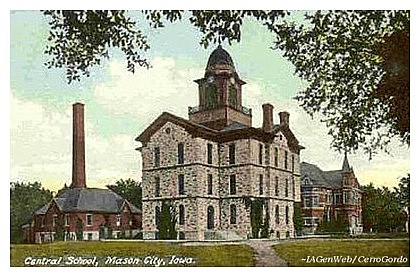
1874 ~ Central School Dedicated ~ 1875 ~ Harvesting Grain 
GILCHRIST, BEECHER, TILTON, BURGE, WEST, ALLEN
Posted By: Sharon R Becker (email)
Date: 11/18/2014 at 12:41:04
The Globe Gazette
Mason City, Cerro Gordo County, Iowa
Monday, June 01, 1953
Mason City Centennial Edition, Section 31874: CENTRAL SCHOOL BUILDING DEDICATED
[Section 3, Page 14] The big event in Mason City in 1874 was the dedication of the new stone central school, which stood on the present site of the school administration building.
Dedication of the building that most citizens felt was too large for the town, took place Oct. 9, 1874, with J. C. Gilchrist, Mason City's first superintendent of schools, giving the address.
Completion of the building came after serious delay caused by the fact that the contractor walked off the job.
Among the national events that attracted attention at this time involved the question of whether the Rev. Henry Ward Beecher, celebrated clergyman, committed adultery with the wife of a parishioner, Theodore Tilton. Throughout August, 1874, papers ran columns on the charges and the clergyman's defense.
The following spring Beecher was the defendant in a lawsuit brought against him by Tilton. The jury was unable to agree on a verdict, standing 9 to 3 for the minister. The minister and the congregation announced they considered that an acquittal.
Mason City at that time had two newspapers, the Republican and the Express, the latter having been started in 1870 after the coming of the railroads promised extensive growth of the community.
* * * * *
1875: FARMERS BIND GRAIN BY HAND
[Section 3, Page 14] There were no combines or other labor saving devices when farmers started growing wheat and oats here in the early days. The reaper, McCormick's invention, was still in use, a big improvement over the implement of the ages, the cradle, but still a far cry from the self binder and the combines that came later.
Even with the use of the reaper, binding of the gran for handling was done by hand. News items of that day reveal that accidents were as likely to happen then as with the faster, more modern machinery of today.
On Aug. 3, 1875, John Burge, living on a farm near Mason City, came near losing his life by carelessly getting in front of the sickle of his reaper, the newspapers here reported that week.
Machine Clogged
The machine had clogged up with heavy grain and Burge went in front of the the sickle to cut loose some straw that had wound around the bar and grain wheel. His situation was not unlike that of the corn picker accidents of a later date.The reaper was in gear for cutting, having a span of mules and a span of horses hitched to it. While Burge was lying in front of the sickle, one of the mules lay down and Burge yelled sharply, "get up."
The mule did get up and the team did the same, starting into a trot, dragging Burge in front of the rapidly vibrating sickle, which cut some deep gashes in his hip. Others in the field succeeded in stopping the team.
* * * * *
JOHN WEST ACTIVE IN EARLY LIFE OF CITY
[Section 3, Page 14] One of the prominent business men of the pioneer period was John West, a native of New York who came to Portland Township in 1855. That same year he built a saw mill at Nora Springs. He then lived on a farm for a time and later moved to Mason City. In 1862 he enlisted in the 32nd Iowa Volunteer Infantry [Co. B 1862 - 1865] and was kept principally on guard duty.
NOTE: John West born December 3, 1825, and died September 29, 1901. His wife, Mary Matilda (Allen) West, was born July 30, 1826, and died November 8, 1923. they were interred at Elmwood-St. Joseph Cemetery, Mason City.
Post card courtesy of Sharon R. Becker
Transcriptions & Note by Sharon R. Becker, November of 2014
Cerro Gordo Documents maintained by Lynn Diemer-Mathews.
WebBBS 4.33 Genealogy Modification Package by WebJourneymen